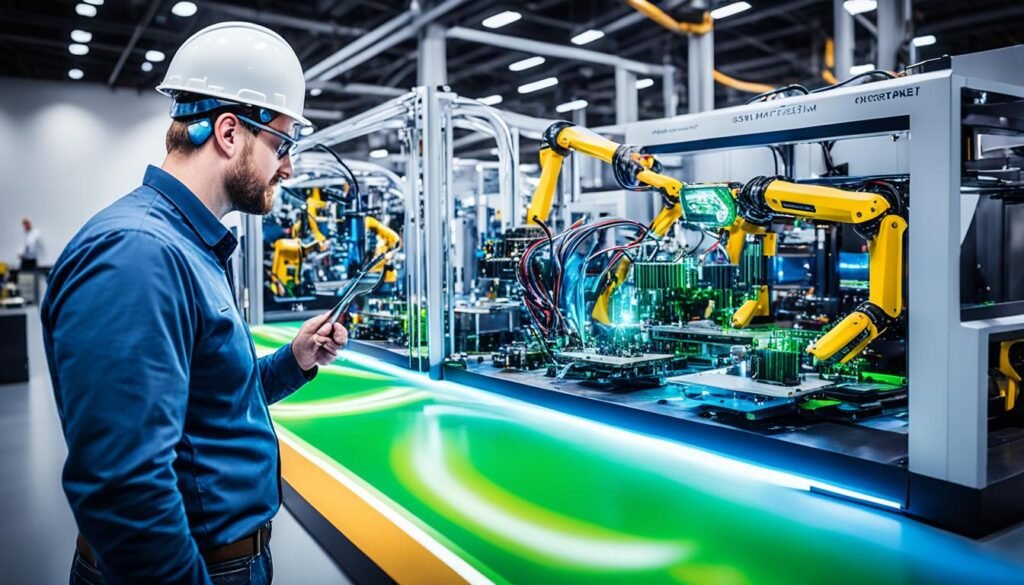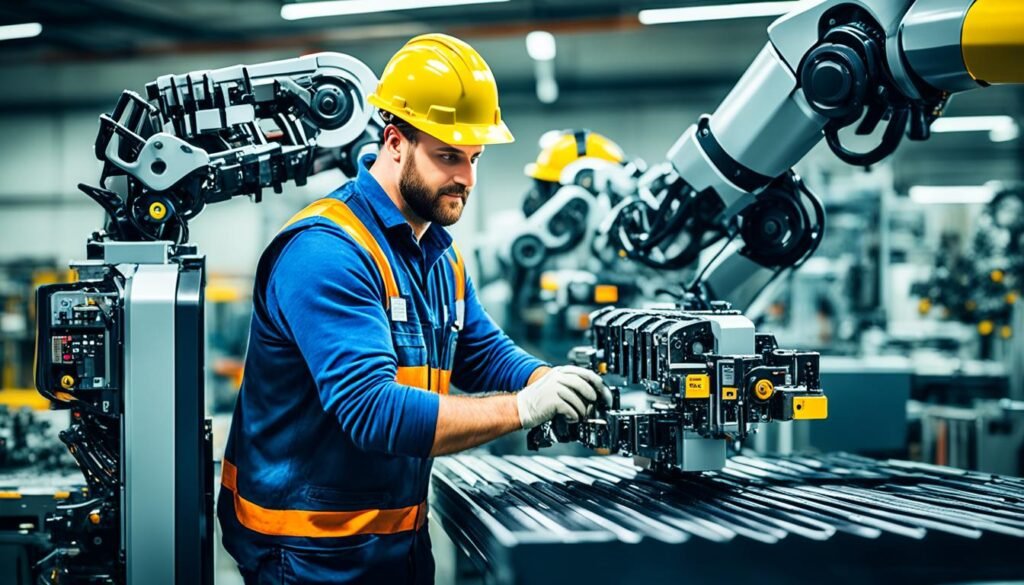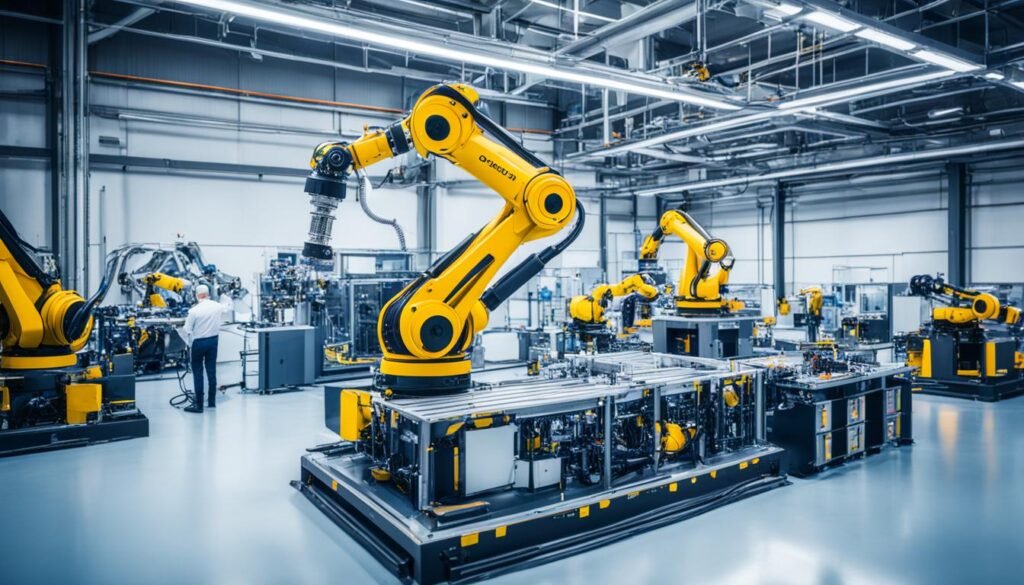Industrial Engineering is a field that has consistently evolved and adapted to meet the changing needs of industries. As we look to the future, Industrial Engineering is poised to play a pivotal role in shaping and revolutionizing the way businesses operate. In this article, we will explore the exciting opportunities and trends that lie ahead for Industrial Engineering professionals, highlighting the key areas…
Key Takeaways:
- The future of Industrial Engineering holds immense potential for growth and innovation.
- Industrial Engineers will continue to optimize productivity through automation and advanced technologies.
- The demand for skilled Industrial Engineers is expected to rise as businesses prioritize efficiency and cost-effectiveness.
- Industrial Engineers will play a crucial role in driving sustainable practices and minimizing environmental impact.
- Developing expertise in data analytics and optimization techniques will be essential in the future of Industrial Engineering.
Embracing Technology Advancements
In today’s rapidly evolving industrial landscape, technology advancements are reshaping the way manufacturing processes are carried out. Industrial Engineers are at the forefront of this transformation, leading the integration of automation and robotics technologies to enhance productivity, efficiency, and safety in a variety of industries.
Industrial Engineers play a critical role in designing, implementing, and optimizing automated systems. By leveraging their expertise, they can create streamlined and highly efficient manufacturing processes that are capable of executing complex tasks with precision and accuracy.
One of the key technological advancements that Industrial Engineers are harnessing is Artificial Intelligence (AI). Through the use of AI algorithms, they can analyze vast amounts of data and extract valuable insights. This enables smarter decision-making, predictive analytics, and optimization of complex systems, leading to improved performance and operational efficiency.
“Automation and robotics technologies have revolutionized the manufacturing industry, and Industrial Engineers are at the forefront, driving this transformation.”
Robotics is another area where Industrial Engineers are making a significant impact. By designing and deploying robots in manufacturing processes, they can handle repetitive, hazardous, or intricate tasks that would otherwise be time-consuming or risky for human workers. This not only improves efficiency but also ensures the safety of the workforce.
Industrial Engineers constantly seek innovative ways to optimize manufacturing processes. They employ automation techniques to streamline workflows, eliminate bottlenecks, and improve overall productivity. Through their expertise, they are able to develop intelligent systems that can adapt to changing demands, further enhancing manufacturing efficiency.
By embracing technology advancements, Industrial Engineers are revolutionizing the manufacturing landscape. With their expertise in automation, robotics, and AI, they are paving the way for more efficient, safe, and productive manufacturing processes.
Benefits of Technology Advancements in Manufacturing
| Benefits | Description |
|---|---|
| Increased Productivity | Automation and robotics technologies enable faster and more efficient production processes, resulting in higher output. |
| Enhanced Efficiency | Automated systems eliminate human error, reduce waste, and optimize resource utilization, leading to improved efficiency. |
| Improved Quality | By eliminating variability and ensuring consistency in processes, technology advancements contribute to higher product quality. |
| Enhanced Safety | Robotics and automation technologies reduce the risk of workplace accidents, as they can handle hazardous tasks. |
| Cost Savings | Through automation and optimization, manufacturing processes become more cost-effective, resulting in reduced expenses. |
Driving Sustainability and Green Practices
Environmental sustainability and waste reduction have become critical priorities in today’s world. Industrial engineers play a crucial role in driving initiatives focused on sustainability, waste reduction, and energy efficiency. They are at the forefront of designing eco-friendly manufacturing processes, optimizing logistics networks, and implementing green supply chain practices.
Industrial engineers actively contribute to the circular economy, a system promoting the reuse, recycling, and repurposing of materials. They develop closed-loop systems that enable the efficient utilization of resources and reduce the impact on the environment.

Designing Eco-Friendly Manufacturing Processes
Industrial engineers are responsible for designing and optimizing manufacturing processes that minimize environmental impact. Through the use of innovative technologies and sustainable practices, they develop eco-friendly production systems that minimize waste generation and energy consumption.
Optimizing Logistics Networks and Supply Chains
Industrial engineers optimize logistics networks and supply chains to reduce carbon emissions, eliminate unnecessary transportation, and enhance overall efficiency. By strategically planning transportation routes, streamlining inventory management, and implementing green packaging solutions, they contribute to waste reduction and environmental sustainability.
Implementing Green Supply Chain Practices
Industrial engineers work closely with suppliers, manufacturers, and distributors to drive green supply chain practices. They ensure the selection of sustainable materials, analyze the environmental impact of supplier operations, and promote responsible sourcing. By implementing sustainable procurement practices, industrial engineers help create a more environmentally conscious and socially responsible business ecosystem.
The Circular Economy: Reuse, Recycle, Repurpose
Industrial engineers play a pivotal role in developing closed-loop systems that enable the reuse, recycling, and repurposing of materials. By designing processes that maximize the lifecycle of products and minimize waste generation, they contribute to the principles of the circular economy. This approach not only reduces environmental impact but also fosters resource efficiency and long-term sustainability.
| Benefits of Industrial Engineers’ Contribution to Sustainable Practices |
|---|
| 1. Minimize waste generation and reduce environmental impact |
| 2. Enhance energy efficiency in manufacturing processes |
| 3. Optimize logistics networks for reduced carbon emissions |
| 4. Promote responsible sourcing and sustainable procurement |
| 5. Facilitate the implementation of closed-loop systems |
Utilizing Data Analytics and Optimization
Industrial Engineers play an essential role in harnessing the power of data analytics and optimization to drive operational excellence. By leveraging advanced analytics techniques, these professionals can extract valuable insights from vast amounts of data, allowing them to identify patterns, improve decision-making, and optimize complex systems.
“Data analytics is the secret weapon that empowers industrial engineers to uncover hidden opportunities for improvement within supply chains and operational processes.”
With the advent of big data analytics, industrial engineers are equipped with the tools to transform raw data into actionable intelligence. By analyzing data trends and patterns, they gain valuable insights that fuel decision-making processes and enable businesses to optimize their operations.
Driving Supply Chain Optimization
One area where data analytics is revolutionizing the field of industrial engineering is supply chain optimization. By analyzing data related to inventory, demand, transportation, and production, industrial engineers can identify bottlenecks, streamline processes, and improve overall efficiency across the supply chain.
- Identifying patterns in customer demand to optimize production schedules
- Analyzing transportation data to minimize costs and improve delivery times
- Utilizing predictive analytics to anticipate supply chain disruptions and proactively mitigate them
Optimizing Processes for Efficiency
Industrial engineers also utilize data analytics to optimize internal processes within organizations. By analyzing data on machine performance, cycle times, and resource allocation, they can identify areas for improvement and implement changes that enhance efficiency and productivity.
- Identifying bottlenecks in production processes and implementing changes to increase throughput
- Optimizing resource allocation to minimize waste and reduce costs
- Applying simulation and optimization techniques to streamline workflows and improve overall process efficiency
By harnessing the power of data analytics and optimization, industrial engineers are at the forefront of driving innovation and achieving operational excellence. Through their expertise in analyzing and interpreting data, they enable companies to make data-driven decisions, optimize processes, and stay ahead in today’s rapidly evolving business landscape.
| Benefits of Data Analytics and Optimization in Industrial Engineering | Key Insights and Outcomes |
|---|---|
| Improved decision-making | Industrial engineers can make informed decisions by analyzing data trends and patterns, leading to better outcomes. |
| Enhanced efficiency and productivity | By optimizing processes and resource allocation, industrial engineers increase productivity and reduce costs. |
| Streamlined supply chain | Through data analysis, industrial engineers identify areas for improvement, driving supply chain optimization and reducing inefficiencies. |
| Proactive problem-solving | Utilizing predictive analytics, industrial engineers can anticipate and mitigate supply chain disruptions or process bottlenecks before they occur. |
Focusing on Human-Centered Design
When it comes to industrial engineering, the focus is not just on machines and processes, but also on the people who work with them. Industrial engineers play a key role in creating work environments that are safe, efficient, and ergonomic. By designing workstations, processes, and workflows that prioritize employee well-being, productivity, and overall satisfaction, industrial engineers help businesses thrive.
One aspect of human-centered design that industrial engineers focus on is ergonomics and work design. Ergonomics is the study of how people interact with their work environment and aims to optimize the relationship between humans and their tools. By considering factors such as posture, physical movement, and comfort, industrial engineers design workspaces that reduce the risk of injury and enhance efficiency.
Furthermore, industrial engineers facilitate the integration of humans and machines, fostering collaboration and leveraging the strengths of both. The collaboration between humans and machines, known as human-machine collaboration, is essential for achieving optimal outcomes in various industries. Industrial engineers strategize ways to design systems that enable seamless interaction and coordination between humans and machines, resulting in improved efficiency and productivity.
| Benefits of Human-Centered Design |
|---|
| Enhanced employee well-being and satisfaction |
| Increased productivity and efficiency |
| Reduced risk of work-related injuries |
| Improved collaboration between humans and machines |
Industrial engineers understand that by prioritizing the needs and capabilities of the people who interact with industrial systems, businesses can achieve higher levels of success. Their expertise in human-centered design allows them to create work environments that not only optimize productivity but also promote the well-being and satisfaction of employees.

By focusing on ergonomics and work design and facilitating human-machine collaboration, industrial engineers contribute to the overall success and efficiency of businesses across various industries. Their ability to understand the complexities of both the human and machine aspects of industrial systems sets them apart as crucial contributors to the future of industrial engineering.
Emphasizing Systems Thinking
Industrial engineers possess a unique skill set that allows them to approach complex real-world problems with a holistic and interdisciplinary mindset. By applying systems thinking tools and techniques, they can analyze and improve the behavior and performance of industrial systems.
Systems thinking is a thought process that involves understanding the interconnections and interdependencies within a system, rather than viewing it as separate parts. This approach enables industrial engineers to identify the root causes, effects, and leverage points that influence system behavior.
“Systems thinking provides industrial engineers with a comprehensive framework to analyze and improve the performance of industrial systems. It helps us understand how different components and processes interact and how changes in one area can impact the entire system.”
Industrial engineers utilize engineering principles and methods to gain a deep understanding of the entire system, including its inputs, processes, outputs, and feedback loops. By analyzing the interactions between these components, they can identify areas for improvement, optimize processes, and uncover opportunities for innovation.
One of the key benefits of applying systems thinking is the ability to anticipate and manage unintended consequences. Industrial engineers can identify the potential ripple effects that changes in one area of the system may have on other areas, allowing them to mitigate risks and optimize performance.
Furthermore, systems thinking enables industrial engineers to consider the wider impact of their decisions and actions. By taking into account social, economic, and environmental factors, they can design more sustainable and resilient systems.
By emphasizing systems thinking, industrial engineers play a crucial role in optimizing industrial systems, improving efficiency, and driving innovation.
Table: Industrial Engineers’ Application of Systems Thinking Principles and Methods
| Key Aspects | How Industrial Engineers Apply Systems Thinking |
| — | — |
| Analysis | Industrial engineers analyze complex industrial systems and identify relationships, interdependencies, and feedback loops that impact system behavior. |
| Modeling | They develop mathematical and simulation models to represent the behavior of industrial systems, enabling the exploration of potential improvements and the prediction of outcomes. |
| Optimization | Industrial engineers use optimization techniques to identify the best possible solutions for improving system performance, efficiency, and reliability. |
| Risk Assessment | They assess the risks associated with system changes and consider the potential unintended consequences to minimize disruptions and maximize positive outcomes. |
| Continuous Improvement | Industrial engineers employ systems thinking to instill a culture of continuous improvement, focusing on long-term optimization and adaptability. |
By embracing systems thinking, industrial engineers gain the ability to understand, analyze, and improve the complex industrial systems of the future. Their expertise in engineering principles and methods, combined with a comprehensive understanding of systems thinking, positions them as valuable assets in driving innovation, sustainability, and success in the industrial engineering field.
Promoting Innovation and Entrepreneurship
Industrial Engineers are at the forefront of driving innovation and entrepreneurship within the industrial sectors. With their unique blend of engineering, analytical, and managerial skills, they play a pivotal role in identifying, evaluating, and executing innovative ideas, projects, and ventures. By fostering collaboration with other disciplines, stakeholders, and ecosystems, industrial engineers generate and diffuse innovation and entrepreneurship, propelling industries forward.
Driving Innovation
Innovation is the driving force behind progress and growth in any industry. Industrial engineers, with their deep understanding of industrial processes and systems, are well-positioned to lead innovation initiatives. They leverage their expertise to identify pain points, evaluate potential solutions, and implement cutting-edge technologies and practices that drive efficiency, sustainability, and competitiveness. By continuously pushing the boundaries of what is possible, industrial engineers enable companies to stay ahead in today’s rapidly changing business landscape.
Nurturing Entrepreneurship
Entrepreneurship is a vital driver of economic growth and job creation. Industrial engineers often possess a unique combination of technical skills and business acumen, making them natural entrepreneurs. They identify market opportunities, assess feasibility, develop business plans, and execute projects with an entrepreneurial mindset. Whether they launch their own startups or join innovative ventures, industrial engineers contribute to the entrepreneurial ecosystem, fueling innovation, economic development, and job creation.
Collaboration for Success
Collaboration is key to successful innovation and entrepreneurship. Industrial engineers recognize the importance of working across disciplines, partnering with diverse stakeholders, and tapping into existing ecosystems. By forming collaborative networks and bridging gaps between different domains, industrial engineers bring together expertise and resources to tackle complex challenges. This collaborative approach fosters the exchange of ideas, enables knowledge sharing, and accelerates the development and diffusion of innovative solutions.
| Benefits of Promoting Innovation and Entrepreneurship | Industrial Engineers’ Role |
|---|---|
| 1. Increased competitiveness and market share | Identifying and implementing innovative technologies and practices that optimize processes, enhance products, and improve efficiency. |
| 2. Sustainable growth and resilience | Developing and scaling sustainable solutions that address environmental challenges and ensure long-term viability. |
| 3. Job creation and economic development | Launching new ventures, driving entrepreneurship, and contributing to the growth of local and global economies. |
| 4. Enhanced customer value and satisfaction | Designing customer-centric products and services that meet evolving needs and exceed expectations. |
Innovation and entrepreneurship are dynamic forces that drive industrial engineering forward, shaping industries and creating opportunities. Industrial engineers, with their diverse skill sets and forward-thinking mindset, are essential in promoting and enabling innovation and entrepreneurship within the industrial sectors.

Impacts of Digital Transformation
Digital transformation is revolutionizing the field of industrial engineering by integrating digital technologies into industrial systems and processes. This transformative shift is driving significant changes in the way industrial engineers work and the opportunities that are available to them. By embracing digital transformation, industrial engineers can leverage a wide range of emerging technologies to enhance their operations and outcomes.
The Integration of Digital Technologies
Industrial engineers are utilizing a variety of digital technologies to optimize their processes and improve productivity. Some key technologies include:
- Artificial Intelligence: Industrial engineers can employ AI algorithms to analyze vast amounts of data, predict outcomes, and optimize systems.
- Big Data: The collection and analysis of large datasets enable industrial engineers to make data-driven decisions and identify opportunities for improvement.
- Cloud Computing: By leveraging cloud platforms, industrial engineers can access powerful computational resources and collaborate on projects seamlessly.
- Internet of Things (IoT): IoT devices allow industrial engineers to connect and monitor equipment, enabling proactive maintenance and real-time data collection.
- Robotics: Industrial engineers are incorporating robotics into manufacturing processes to automate tasks, increase efficiency, and enhance safety.
The Benefits of Digital Transformation
The integration of digital technologies offers numerous benefits for industrial engineers and the organizations they work with:
“Digital transformation empowers industrial engineers to collect and analyze data, enhance decision-making processes, and create smart, connected systems that drive operational excellence.” – Jane Thompson, Industrial Engineering Expert
With access to real-time data, industrial engineers can identify bottlenecks, inefficiencies, and opportunities for improvement within their systems. This data-driven approach allows for targeted optimization efforts that result in increased productivity, reduced costs, and improved overall performance.
Additionally, digital transformation enables industrial engineers to improve collaboration and communication across departments, fostering a more connected and agile organization. By embracing emerging technologies, industrial engineers can adapt to changing market demands and position their organizations for long-term success.
Challenges and Considerations
While digital transformation offers exciting opportunities, it is not without its challenges:
- Adoption: Implementing new technologies requires careful planning, training, and change management to ensure successful adoption and utilization.
- Data Security: Industrial engineers must prioritize data security to protect sensitive information and maintain the trust of customers and stakeholders.
- Skills and Knowledge: Industrial engineers need to continuously update their skills and stay abreast of emerging technologies to effectively leverage digital transformation.
- Integration: Integrating different digital technologies into existing systems can be complex and requires careful consideration of compatibility and interoperability.
Shaping the Circular Economy
Industrial engineers play a crucial role in implementing sustainable practices and optimizing resource efficiency, contributing to the development of a circular economy. By focusing on minimizing waste and designing products and processes for reuse, repair, remanufacturing, and recycling, these professionals drive positive environmental impacts and foster a more sustainable future.
In their pursuit of resource optimization, industrial engineers analyze the entire life cycle of products and materials. Their expertise enables them to identify opportunities for waste reduction and implement sustainable solutions that align with circular economy principles. By optimizing the use of resources, industrial engineers help businesses achieve greater efficiency while minimizing negative environmental impacts.
To illustrate the impact of industrial engineers in shaping the circular economy, consider the example below:
Example: A company manufacturing electronic devices realizes that many of their products are disposed of after a relatively short lifespan due to minor faults or outdated technology. By collaborating with industrial engineers, the company can implement a repair and refurbishment program, extending the life of their products. This approach reduces electronic waste, conserves valuable resources, and contributes to the principles of the circular economy.
Industrial engineers, with their expertise in optimizing processes and systems, help businesses transition towards sustainable practices. Their focus on resource efficiency not only benefits the environment but also leads to cost savings and improved overall sustainability performance.

| Benefits of Industrial Engineers in Shaping the Circular Economy |
|---|
| Minimize waste through efficient design and production processes |
| Optimize resource utilization and reduce resource consumption |
| Develop closed-loop systems for the reuse, recycling, and repurposing of materials |
| Design products and processes for extended lifespan and durability |
| Implement sustainable supply chain practices to reduce environmental impacts |
By leveraging their expertise in resource optimization and sustainable practices, industrial engineers are driving the transition towards a more circular economy. Their role in shaping sustainable business practices is critical in creating a greener and more environmentally friendly future.
Harnessing the Power of Data Analytics
Industrial engineers play a crucial role in optimizing complex systems and improving production schedules through the strategic utilization of big data analytics. By analyzing and interpreting vast amounts of data, they can extract valuable insights that drive operational excellence and inform key decision-making processes.
With their expertise in data analysis, industrial engineers are equipped to identify patterns and trends that may not be immediately apparent. By leveraging big data analytics, they can uncover hidden correlations, optimize processes, and drive efficiency across various industrial systems.
One area where data analytics proves invaluable is in optimizing production schedules. By analyzing historical production data, industrial engineers can identify bottlenecks, inefficiencies, and areas for improvement. Using these insights, they can develop data-driven strategies to optimize production schedules, allocate resources effectively, and minimize downtime.
“Big data analytics enables industrial engineers to make informed decisions that lead to substantial improvements in productivity and operational efficiency,” says John Miller, a renowned industrial engineer. “By leveraging data insights, we can optimize complex systems, streamline processes, and drive continuous improvement in the industrial landscape.”
Furthermore, industrial engineers can use data analytics to identify potential risks and mitigate them proactively. By monitoring real-time data, they can detect anomalies and deviations from expected performance, enabling early interventions to avoid costly disruptions.
Optimizing Complex Systems with Data Analytics
Data analytics empowers industrial engineers to optimize complex systems by providing a comprehensive understanding of their behavior. By employing advanced analytical techniques, such as machine learning algorithms and statistical modeling, they can uncover underlying patterns and relationships within data sets.
These insights enable industrial engineers to identify areas of improvement and implement targeted strategies to enhance system performance. By continuously monitoring and analyzing data, they can track the impact of these strategies and make data-driven adjustments when necessary, ensuring ongoing optimization.
Unlocking Insights for Operational Excellence
The ability to analyze data effectively allows industrial engineers to unlock valuable insights that drive operational excellence. By studying production data, quality metrics, and process variables, they can identify inefficiencies, optimize resource allocation, and streamline workflows.
Moreover, data analytics enables industrial engineers to predict and prevent system failures by identifying early warning signs and implementing proactive maintenance strategies. By harnessing the power of data, they can predict maintenance needs, minimize downtime, and improve overall equipment effectiveness.
Industrial engineers rely on data analytics to continuously monitor performance, identify areas for improvement, and make data-driven decisions that enhance operational efficiency. By leveraging the insights gained from data analysis, they can drive sustainable improvements and propel industries forward in an ever-evolving landscape.
Empowering Human-Machine Collaboration
Industrial engineers play a crucial role in designing systems that foster collaboration between humans and machines. By optimizing human-machine collaboration, these professionals can effectively reduce costs, improve efficiency, and enhance overall productivity within various industries. The integration of humans and machines allows for innovation and paves the way for the future of industrial engineering.
In today’s technological landscape, the collaboration between humans and machines is essential for achieving the highest levels of performance and output. Industrial engineers have the expertise to design systems that seamlessly integrate human and machine capabilities, resulting in synergistic collaborations that drive productivity and innovation.
Through the strategic design and implementation of collaborative systems, industrial engineers can unlock various benefits. Reduced costs are achieved by maximizing the strengths of both humans and machines, utilizing automation and technology to streamline processes and eliminate inefficiencies. Improved efficiency is a direct result of optimized workflows and the allocation of tasks between humans and machines based on their respective abilities and strengths. As a result, industrial engineers can enhance overall productivity, elevate operational performance, and drive continuous improvement.
Industrial engineers leverage their knowledge of human-machine collaboration to optimize the allocation of tasks, ensuring that each component performs at its best. They consider factors such as workload distribution, ergonomic design, and cognitive abilities, ensuring that humans and machines can work together harmoniously and efficiently.
By prioritizing human-machine collaboration, industrial engineers contribute to the successful integration of automation and technology within various industries, including manufacturing, logistics, and healthcare. They are at the forefront of designing systems that utilize the unique strengths of both humans and machines, creating a symbiotic relationship that maximizes output, minimizes errors, and supports overall business goals.
“By optimizing human-machine collaboration, industrial engineers can reduce costs, improve efficiency, and enhance overall productivity.”
Benefits of Human-Machine Collaboration in Industrial Engineering
There are several key benefits that result from effective human-machine collaboration in industrial engineering:
- Improved task allocation and workload management, ensuring the efficient use of resources and capabilities.
- Enhanced safety and risk mitigation through the automation of repetitive or hazardous tasks.
- Increased accuracy and quality of work, minimizing errors and variability.
- Accelerated decision-making processes through the fusion of human expertise and machine insights.
- Optimized utilization of technology and automation to drive productivity and output.
By harnessing the power of human-machine collaboration, industrial engineers can unlock the full potential of automation and technology, enabling businesses to thrive in today’s competitive landscape.
Also Read:- Discover The Craftsmanship Of Randolph Engineering Sunglasses

Conclusion
The future of industrial engineering is bright and filled with exciting opportunities. As we move forward, emerging trends and innovative technologies will continue to shape the field. With the integration of automation, robotics, and artificial intelligence, industrial engineers will play a crucial role in optimizing processes, improving productivity, and driving innovation.
Sustainable practices will also be at the forefront of industrial engineering, as professionals focus on minimizing waste, improving resource efficiency, and designing eco-friendly manufacturing processes. The demand for skilled industrial engineers will be high, as companies recognize the value they bring in creating sustainable and environmentally conscious solutions.
To thrive in this dynamic field, aspiring and current industrial engineering professionals should stay updated with emerging trends and technologies. Enhancing their skill sets and adopting a lifelong learning mindset will ensure they remain competitive and well-equipped to tackle the challenges of the future. With a strong foundation in sustainable practices and a deep understanding of innovative technologies, industrial engineers will continue to shape the industrial landscape and contribute to the success of businesses worldwide.
FAQs
-
Q: What is industrial engineering and what are the career opportunities in this field?
A: Industrial engineering focuses on optimizing complex systems, processes, and organizations to increase efficiency and productivity. Career opportunities in industrial engineering include roles in quality control, supply chain management, manufacturing systems, and more.
Q: How is the job outlook for industrial engineers?
A: According to the Bureau of Labor Statistics, employment of industrial engineers is projected to grow faster than the average for all occupations. The demand for industrial engineers is driven by the need for companies to improve efficiency and control costs.
Q: What is the median annual wage for industrial engineers?
A: The median annual wage for industrial engineers is higher than the average for all occupations. Industrial engineers play a crucial role in helping organizations streamline processes and increase profitability.
Q: What are the educational requirements for a career in industrial engineering?
A: To pursue a career in industrial engineering, individuals typically need a degree in industrial engineering or a related field. Coursework in areas such as mathematics, science, and engineering principles is also important.
Q: How do industrial engineers help improve quality control in manufacturing processes?
A: Industrial engineers may work on developing systems and processes to ensure products meet quality standards. They use their analytical and problem-solving skills to identify and address potential issues in manufacturing operations.
Q: What are some of the key skills needed for a successful engineering career?
A: Industrial engineers need strong analytical skills, attention to detail, problem-solving abilities, and a solid understanding of engineering principles. Communication skills and the ability to work in teams are also important for collaborating with colleagues and stakeholders.
Q: What are the future trends and innovations in industrial engineering?
A: The future of industrial engineering is likely to involve advancements in technology, automation, and data analytics. Industrial engineers are projected to play a key role in implementing these innovations to optimize processes and drive business growth.
Source Links
- https://resources.sw.siemens.com/en-US/e-book-4-trends-advanced-machine-engineering
- https://www.linkedin.com/pulse/industrial-engineering-future-embracing-innovation-driving-asgar-
- https://www.linkedin.com/advice/1/what-can-you-learn-future-industrial-engineering

